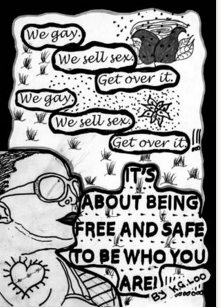Amnesty International publishes policy and research on protection of sex workers’ rights
Amnesty International has published its policy on protecting sex workers from human rights violations and abuses, along with four research reports on these issues in Papua New Guinea, Hong Kong, Norway and Argentina.
Sex Worker Zine Project
The Sex Worker Zine Project features work that was produced by 24 men, women and transgender participants who live and sell sex in the Limpopo and Mpumalanga provinces of South Africa. The project involved collaboration with the Sisonke Sex Worker Movement and the MoVE Project.
Sexual Politics in April 2016
A new wave of deadly attacks against human rights and secular activists is at play in Bangladesh. In final April, two LGBT activists were hacked
Why We Need to Bridge the Gap between Sex Workers’ Movements and Abortion Rights Activism
In an interview a few years back, Canadian feminist and pro-choice activist Joyce Arthur drew a convincing parallel between the movement for women’s right to access safe and legal abortion and sex workers’ movements for their rights and decriminalisation of sex work.

News and analysis on the French law criminalizing customers of sex work
The Paternalistic Fallacy of the “Nordic Model” of Prostitution – Huffington Post France passes law making it illegal to pay for sex – The Guardian

The sexual politics in March and early April 2016
We have the great pleasure to inform that our Spanish page has been re-launched. In this opportunity Alejandra Sardá from Akahatá has written an update

South Korea prostitutes decry court ruling, demand right to work
South Korean activist prostitutes said on Thursday they would appeal to the United Nations to win back their right to work after the Constitutional Court rejected a petition to overturn a law that punishes sex workers.

GATE Statement on the International Trans Day of Visibility 2016
Originally posted on 31/03/2016 at GATE. Available at: http://gate.ngo/2016/03/31/gate-statement-on-the-international-trans-day-of-visibility-2016/ Today, March 31st, Global Action for Trans* Equality (GATE) calls for collective and critical reflection as

Why Cambodia’s sex workers don’t need to be saved
Eyes gouged out for insolence, moms selling daughters to pimps, girls showered with maggots — if it happened in a Cambodian brothel, the story is never too shocking for Westerners to believe.

Three myths about sex work that harm everyone
It’s not just young girls and big bad wolves. Lies and misconceptions about sex work can hurt women and keep negative stereotypes alive.




